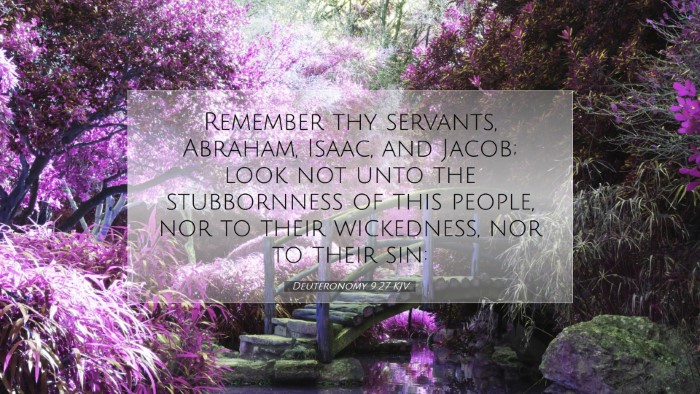Commentary on Deuteronomy 9:27
Verse Text: "Remember thy servants, Abraham, Isaac, and Jacob; look not unto the stubbornness of this people, nor to their wickedness, nor to their sin."
Introduction
The verse in Deuteronomy 9:27 forms part of Moses' address to the Israelites as he prepares them to enter the Promised Land. It is critical in understanding the nature of God's covenant with Israel, the significance of intercession, and the complexities of human sinfulness in the light of divine grace.
Contextual Background
Moses, as the leader of the Israelites, recalls their journey from Egypt and their frequent rebellions against God. This chapter marks a pivotal moment where Moses intercedes on behalf of a rebellious people, reflecting his leadership and concern for their future with God.
Historical Context
The Israelites had just witnessed mighty acts of God, yet they were prone to disobedience. Deuteronomy serves as a reminder of the law and the covenant made with their ancestors. In this context, Moses calls upon God to consider the patriarchs rather than the people's sins.
Commentary Insights
Moses' Appeal to God
Moses’ request demonstrates the role of the intercessor; he pleads with God based on His covenant with patriarchs like Abraham, Isaac, and Jacob.
- Matthew Henry: He emphasizes that Moses appeals to God's faithfulness, reminding God of His promises. This is not an attempt to manipulate God but recognizes the righteous character of God bound by His covenants.
- Albert Barnes: Barnes observes that Moses seeks to invoke the historical relationship and faithfulness of the patriarchs. He understands that God's grace extends through generations, encouraging believers to have faith in divine mercy.
- Adam Clarke: Clarke highlights the importance of the names of the patriarchs as a reminder of God's unchanging nature. He suggests that the collective memory of these ancestors serves as a foundation for the acts of grace and mercy upon which the nation relies.
Focus on Rebellion and Sin
The stark mention of "stubbornness," "wickedness," and "sin" drives home the reality of human depravity.
- Matthew Henry: He states that the acknowledgment of sin is essential. It serves as a recognition of the people's failures, which should lead to humility and repentance.
- Albert Barnes: Barnes points out that while Moses acknowledges their shortcomings, he reinforces God’s goodness and patience in dealing with them, indicating that God’s grace is essential in overcoming human sinfulness.
- Adam Clarke: Clarke elaborates on the dimensions of sin, considering it not merely as actions but evidences a heart that rebels against God's authority. The appeal to God’s mercy is made in light of this understanding.
Theological Implications
This verse highlights several theological principles:
- Intercession: The act of Moses praying for the people illustrates how leaders can intercede on behalf of others, much like Christ’s intercessory role for believers.
- Covenantal Faithfulness: The verse reinforces that God's fidelity is prominent in the narrative of the Bible. His covenant with the patriarchs serves as a precursor to His relationship with Israel.
- Human Sinfulness: The mention of stubbornness and sin serves to remind readers of humanity's fallen state and need for redemption.
Practical Application
For pastors, students, theologians, and Bible scholars, this verse prompts self-reflection on the nature of prayer and the power of memory in faith. Here are several applications:
- Encouragement in Leadership: Leaders are reminded of their role as intercessors, urging them to advocate for their congregations and communities before God.
- Importance of Reminders: The call to remember the patriarchs teaches the value in honoring spiritual ancestors and the faithfulness of God throughout history.
- Call to Repentance: This passage underscores the need for communities to acknowledge their shortcomings and seek restoration through repentance.
Conclusion
Deuteronomy 9:27 encapsulates the essence of intercessory prayer and highlights the tension between human sinfulness and divine mercy. It serves as a powerful reminder of God's unchanging character and the importance of recalling His promises amidst our failures. The insights from historical commentaries deepen our understanding of this sacred text, encouraging us to reflect on our own faith journey and the incredible grace we receive as we seek to follow God.


